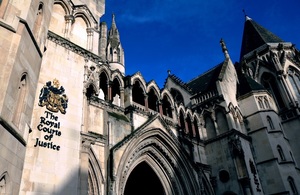Foreign Secretary’s statement on Belarus: 24 September 2020
With permission, Madam Deputy Speaker, I would like to make a statement regarding the situation in Belarus.
As the House will recall, on 9 August, Belarus held Presidential elections which were neither free nor fair. The election campaign was itself characterised by the imprisonment of opposition candidates and the arrest of hundreds of their supporters.
On polling day, on 9 August, witnesses reported extensive fraud and falsification of results.
Local independent observers were barred from witnessing the count, including members of the British Embassy who were threatened and then removed from a polling station.
The Belarusian authorities prevented independent international monitoring of the electoral processes by refusing to cooperate with OSCE election monitors.
And, as a result, thousands of Belarusians took to the streets in, what can only be described as, peaceful protest. They challenged Lukashenko’s claim to have won 80 percent of the vote and they demanded fresh elections. And they have been peacefully protesting in huge numbers right across Belarus ever since.
The world has watched, frankly, in horror at the response of the Belarusian authorities. They launched a campaign of violence, intimidation and harassment against peaceful protestors. We have seen horrific scenes of militia attacking demonstrators and dragging them away.
UN human rights experts report that the authorities have beaten those they held in detention and they’ve threatened female protestors with violence, including rape.
The Belarusian authorities have targeted journalists, including the BBC, and shut down the internet in order to hide their actions.
Opposition leaders set up a Coordination Council to organise peaceful protests.
In response, the authorities abducted, imprisoned and expelled all but one of the Coordination Council’s Board members. Svetlana Tikhanovskaya has been exiled to Lithuania. And the prominent campaigner Maria Kolesnikova has been imprisoned and charged with destabilising the state.
Only yesterday, Lukashenko was sworn in at a hastily organised and unannounced ceremony. Frankly, hiding his inauguration from the people of Belarus only serves to reinforce Lukashenko’s lack of legitimacy.
Madam Deputy Speaker, the UK, the West and the world cannot sit idle while the Belarusian people’s democratic and human rights are violated so brutally in clear violation of Belarus’s obligations as a member of the OSCE.
So, for our part, the UK has worked with our key international partners first to promote a peaceful resolution, but also to condemn the actions of the Belarusian authorities and to hold those responsible to account.
I discussed the situation and our response with the Foreign Ministers of France and Germany at Chevening on 10 September. I also discussed the issue and the situation with Lithuanian Foreign Minister when he visited London last week.
I’ve also just returned from Washington where I agreed with Vice President Pence and Secretary of State Pompeo to coordinate the UK and the US response. The Minister for Europe has spoken to Svetlana Tikhanovskaya and Svetlana Alekseivich.
So now, Madam Deputy Speaker, let me be clear on the UK’s position and our approach.
First of all we don’t accept the results of this rigged election.
Second, we condemn the thuggery deployed against the Belarusian people.
We have led the way, working with 16 of our international partners, so that on 17 September, we triggered the Moscow Mechanism in the OSCE, which initiates a full and independent investigation into both the electoral fraud and human rights abuses carried out by the Belarusian authorities.
It is absolutely critical that those responsible are held to account.
Madam Deputy Speaker, we are willing to join the EU in adopting targeted sanctions against those responsible for the violence, the repression and the vote rigging in Belarus, although the EU process has now been delayed in Brussels.
Given that delay Madam Deputy Speaker, given Lukashenko’s fraudulent inauguration, I have directed the FCDO’s sanction team to prepare Magnitsky sanctions for those responsible for the serious human rights violations, and we are coordinating with the United States and Canada to prepare appropriate listings as a matter of urgency.
Next, Madam Deputy Speaker, we must support and strengthen civil society and the brave media outlets struggling to shine a light on the repression that we are seeing inflicted by the Belarusian authorities on its people.
The government has already been working with our partners in Belarus to this effect. But we must do more.
So I have doubled our financial support to human rights groups, independent media organisations and community groups, providing an extra £1.5 million over the next 2 years.
That includes £800,000 of support for journalists, in particular, in Belarus. That UK funding will help train journalists, it will provide support to those detained by the authorities, and it will also help replace equipment that’s been destroyed or confiscated.
We will apply all the tools at our disposal to hold Lukashenko and his regime to account. And we call on him to engage in serious and credible dialogue with the opposition, via mediation if necessary, in order to facilitate a peaceful outcome to the current crisis. And one which reflects, and respects, the will of the Belarusian people.
Madam Deputy Speaker, if the authorities in Belarus fail to respond, based on the outcome of the OSCE investigation, which we have triggered, we will consider further actions with our international partners.
Our vision for Global Britain means standing up for democracy and human rights. That’s what we are doing in Belarus.
And I commend this statement to the House.
